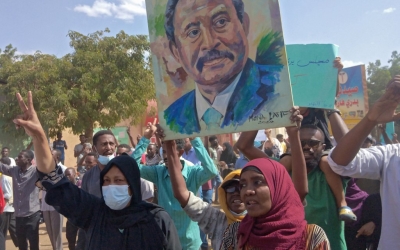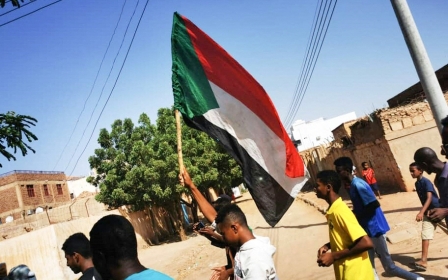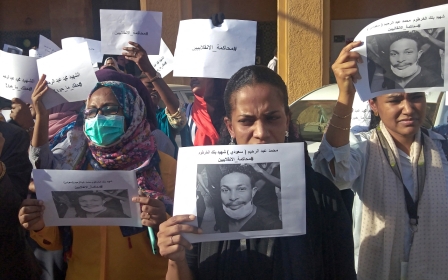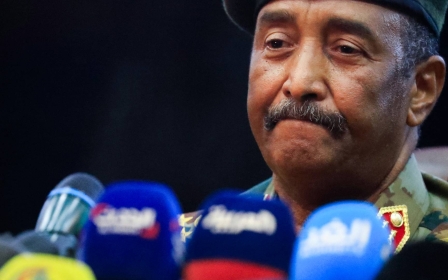Sudan coup: Internet cuts thwart civil disobedience campaign

Sudanese pro-democracy groups launched two days of civil disobedience and strikes on Sunday in protest at last month's military coup, although participation appeared to be limited by continuing interruptions to internet and phone connections.
Local "resistance committees" and the Sudanese Professionals Association (SPA), which led demonstrations in the uprising that toppled the then-president Omar al-Bashir in April 2019, are organising a campaign of protests to try to reverse the military takeover.
People were out on Sunday on the streets in the centre of the capital, Khartoum, according to Reuters, though there was less traffic than usual, residents said.
A teachers' union said security forces used tear gas at the Khartoum State education ministry building to break up a sit-in staged to oppose any handover to military appointees.
Some 87 people were arrested, it said.
"We organised a silent stand against the decisions by [commander-in-chief of the military General Abdel Fattah Abdelrahman al-Burhan]," said geography teacher Mohamed al-Amin, who took part in the protest.
"Police came and fired tear gas at us, though we were simply standing on the streets and carrying banners."
In the Burri neighbourhood of Khartoum and across the river in the Ombada area of Omdurman, police also used tear gas to break up protests, eyewitnesses said.
"The authority belongs to the people", protesters chanted, calling "no, no to military rule", and demanding a "civilian government", according to AFP.
There were protests too in the cities of Medani, Nyala, and Atbara, where hundreds protested against the reappointment of Bashir loyalists in local government, eyewitnesses said.
Some hospitals and medical staff in Khartoum were working normally while others were on strike.
"A number of people did not know about the call for civil disobedience because of the internet cut," said one resident in central Khartoum, who asked not to be named.
Internet disruption
Internet services have been badly disrupted since the 25 October military takeover, and phone coverage remains patchy. Though daily life came to a near standstill, shops, roads, and some banks have since reopened.
The coup halted a power-sharing arrangement between the military and civilians that had been agreed upon following Bashir's overthrow and was meant to lead to democratic elections by late 2023.
Top civilians including several ministers were detained, and Prime Minister Abdalla Hamdok was placed under house arrest.
On Thursday, the military released four civilian members of the government.
'We call upon the military leadership to cease arresting politicians and activists and to stop committing human rights violations'
- UN Special Representative for Sudan Volker Perthes
But other key officials are still under guard and, on that same day, security forces arrested other civilian leaders near a United Nations building in Khartoum, following their meeting with UN Special Representative for Sudan Volker Perthes.
"We call upon the military leadership to cease arresting politicians and activists and to stop committing human rights violations," Perthes said.
Since the coup, mediation efforts involving the United Nations have sought the release of detainees and a return to power-sharing, but sources from the ousted government say those efforts have stalled.
On Sunday, Abdel Fattah al-Burhan, who led the coup, met an Arab League delegation, which stressed the importance of dialogue and the democratic transition, his office said in a statement.
Burhan told the delegation the military was committed to achieving "the Sudanese people's ambitions", the statement said.
The Arab League delegation later met ousted Prime Minister Abdalla Hamdok for "lengthy talks" on challenges facing the transitional process and efforts to support dialogue, the regional organisation said in a statement
Later on Sunday, Burhan said he would not participate in any government that comes after a transitional period, Al Jazeera reported.
He also denied that the army was responsible for the deaths of protesters.
"The Sudanese army does not kill citizens, and there are investigation committees to reveal what happened," he said.
At least 14 demonstrators have been killed and about 300 wounded in protests since the military takeover, according to the independent Central Committee of Sudan's Doctors.
Activists demanding that the military exit politics have announced a schedule of protests leading up to mass rallies on 13 November under the slogan "no negotiation, no partnership, no compromise".
Rebel factions
Western powers have paused economic assistance to Sudan and say that relief on tens of billions of dollars of foreign debt is at risk unless there is a return to democratic transition.
On Sunday, key Sudanese rebel factions that signed a peace deal last year condemned the coup and called for the release of detainees.
The statement condemning the coup came from the Sudanese Revolutionary Front, which includes groups led by three members of the military-civilian ruling council dissolved during the takeover: Elhadi Idris and Altahir Hajar from Darfur and Malik Agar of the southern SPLM-N.
Some peace deal signatories including Darfur rebel group leaders Jibril Ibrahim and Minni Minawi had aligned with the military in the weeks leading up to the coup.
Middle East Eye delivers independent and unrivalled coverage and analysis of the Middle East, North Africa and beyond. To learn more about republishing this content and the associated fees, please fill out this form. More about MEE can be found here.





